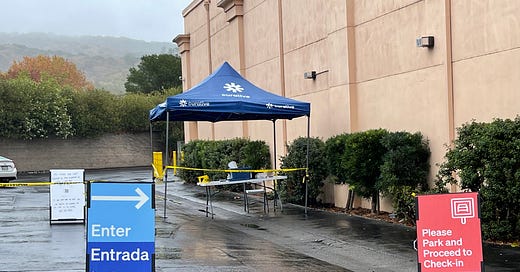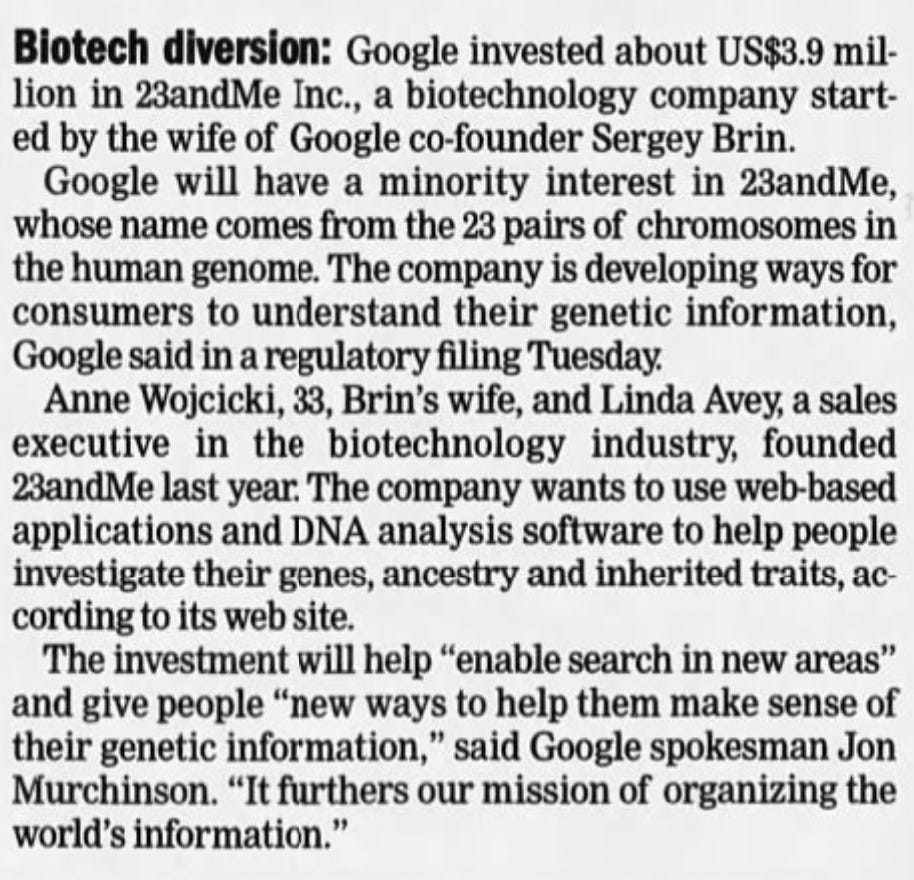The End of Personal Genomics... Or Its New Beginning?
What we're thinking about an essential industry

Let’s consider the coronavirus for a moment.
If you’re like me you took a number of coronavirus tests. It was a strange process where that swab went up your nose. Did it nick your brain?
Who knows where all that biological material ends up. Maybe China. Maybe into the cooler. As I said, who knows? Certainly not the WHO, which President Trump is allegedly in the process of exiting — again.
And to be sure there were a lot of scams during the coronavirus scare. Looking at you, Curative and Matt Michelsen. I’ve written on this before but every once and while it merits another mention.
But if I know anything about government in the time that I’ve lived in Northern Virginia someone, somewhere is just sitting on a biobank filled with biological material to sequence.
In those nasal swabs there is tremendous information. Will anyone sequence them?
Let me suggest to you a different future than the one imagined when personal genomics emerged as the hot new thing.
There’s a case to be made that the whole company itself was born out of a marriage between the Google cofounder Sergey Brin and biotech entrepreneur Anne Wojcicki.
We’ve been over how much Google itself was created by the University of Maryland and the NSA. No need to repeat ourselves.
You can get a sense of that when you dig into a May 23, 2007 piece in Bloomberg, quoting Google spokesman Jon Murchinson.
You can see the NSA touches here: “The investment will help ‘enable search in new areas’ and give people ‘new ways to help them make sense of their genetic information,’ said Google spokesman Jon Murchinson. ‘[The investment] furthers our mission of organizing the world’s information.’”
Somehow along the way Wojcicki stole 23&Me from its other cofounder. She’s known for her hubris. She and Sergey got divorced. People didn’t trust Anne Wojcicki and that trust was further eroded when the company was hacked in 2023.
Today 23 & Me is utterly collapsing. ProPhase, a lab company backed by the UAE, is effectively done.
I feel silly and embarrassed for thinking I could or should work with those companies. Illumina, for all my hopes, has not fixed its underlying problems.
You can see this in the stock prices. They’re not good.
The public is turning on home genetic tests, too.
And yet Evergreen Life, a Manchester, U.K. -backed startup, is seemingly going from strength to strength.
Evergreen Life’s sales grew by an average of 554% a year over the last three years, reaching £36.1m in 2024. Over the same period it grew its headcount from 50 to 500 employees, and plans to create another 100 jobs in the next 12 months.
If Google could be said to be created by the NSA, Evergreen Life is seemingly created by the NHS and a plucky pharmacist turned entrepreneur named Steve Critchlow.
There the picture is much more interesting.
Here’s how the British press described it:
Steve Critchlow is a former chair of the National Institute for Health and Care Research’s committee on AI in healthcare.
The app also has health checkers so users can gauge how healthy they are based on GP records, diet, DNA, mental health and lifestyle. It gives a ‘wellness score’ and allows patients to order repeat prescriptions. It is available at all GP surgeries.
Critchlow’s experts worked with Manchester University to refine its capabilities.
He told Insider that people in the UK can, on average, can expect 18 years' ill health before death, while in Sweden it is around half that.
Critchlow said: "The app essentially helps people take control of their destiny by amassing and assembling vital healthcare and lifestyle information - it's the only wellness app connected to the NHS system, with 99.5% of GP practices in England in turn having at least one patient connected to their GP. The chase to prevent rather than cure is on.”
Critchlow added: "It's no secret that the NHS is struggling to cope with the sheer weight of demand. The app can be shared with GPs, NHS Trusts and other healthcare organisations to ensure accurate understandings of patients' health and wellbeing status, and helps avoid delays in assessment and treatment.
"The UK is generally stuck in a rut of chasing and deploying cures when it could be focussing on keeping people well, and avoiding sickness - the app saves time and money, and enhances the efficiency of the patient-NHS relationship."
He told The Sunday Times: "We use machine learning and AI to create digital therapeutics and diagnostics.
“We do that by encouraging all our users to have a personal health record so that they can take the record from each of the places that they are treated and own it. This means they can share it, both for research and their own care.”
Could we build something like this in America? Sure, especially if we bring over a scientist or two from the United Kingdom. We’re always at our best when we integrate with our real friends.
Indeed one of the reasons I didn’t get vaccinated is that I heeded the warmings about the vaccines from my British doctor friends who noted, quite rightly, that the vaccine had adverse reactions for those of us with bad hearts. I checked my genetics and made a calculation. No vaccine for me. Of course that meant missing my brother’s wedding — everyone got covid anyway — but at least I didn’t damage my heart.
There’s a lot of discussion about companies like Palantir raiding the National Health Service but I wonder how many Americans would be perfectly happy to be a part of the NHS, assuming, of course, it had American characteristics.
Over in North America genomics is increasingly used to solve crime.
Canada and America presents a glimpse into a future where every crime which has DNA is solved with genomic sequencing. That’s not science fiction. It’s happening right now, all around North America.
Genomic data is useful on the population level and not so much on the individual level.
You could also imagine a world in which anyone doing a genome wide associated study is compelled to send that data to a centralized clearing house, possibly run by a government or a governmental contractor.
Maybe that clearing house is at Johns Hopkins or Howard. Maybe it’s a consortium where scientists can check one another’s work?
In my mind’s eye I imagine every genome wide associated study being sucked up into a centralized database, citizens being alerted to when they deviated too much or if they have rare, important variants, and the federal government officers gets anomized reports about the public health.
You could imagine a world of genomics sequencers hovering up the air and making sure our biosphere was doing well.
It’s an impossibility to do Twelve Monkeys but it’s not that hard to use a virus to wipe out our animals or hurt our crops. We need to think about protecting our homeland and our world and all the creatures who live here alongside us.




